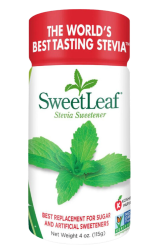The World Health Organization advises not to use non-nutritive sweeteners for weight control.
Specifically, their statement says:
Non-Sugar sweeteners should not be used nor expected to assist in weight loss. In fact clinical studies link their use to actually increased risk of new-onset obesity, cardiovascular disease, mortality and preterm labor according to the World Health Organization! (WHO Guideline, 2023)
Guess what sweetener was included in the non-nutritive sweetener list you should avoid? Stevia!
The recommendation … includes all synthetic and naturally occurring or modified non-nutritive sweeteners that are not classified as sugars. Common NSS include acesulfame K, aspartame, advantame, cyclamates, neotame, saccharin, sucralose, stevia and stevia derivatives.
And while the report does not specifically mention Monk Fruit, because it says “naturally occurring non-nutritive sweeteners.”
So, is it time to abandon Stevia and Monk Fruit in our diets? Do they actually cause adverse health effects? And what alternatives do we have?
Before we go further, let’s highlight an interesting statement in the full WHO report.
Although limited evidence suggests that individual NSS may also differ in some of their physiological effects in humans, the evidence is currently insufficient to make recommendations for individual NSS.
And therein lies the problem with this sweeping advice. The WHO lumped all of these non-nutritive sweetener studies into one big category. They ignored the nuance of differences in these sweeteners and how they act in our bodies. At least we can agree, we need more research on individual non-nutritive sweeteners, so we can make informed decisions about how each of these affect our health. Let’s dig in to the details.
What’s in this article?
Nutrition World Founder’s Opinion on the WHO’s non-nutritive sweetener advice
How Aspartame Alters Brain Chemistry
Damage Caused by Sucralose
Why Acesulfame Causes Weight Gain
Harmful Effects of Saccharin
Stevia and Stevia Derivatives – There IS a Difference!
What Makes Monk Fruit Different?
Founder of Nutrition World’s Opinion on WHO Non-nutritive Sweetener Advice
I find the WHO’s late-to-the-game advice always dismaying. The nutrition industry that I have lived within for 44 years started quoting early research 15 years ago, showing non-nutritive sweeteners cause weight gain.
Yet remember that mainstream almost always requires a decade or more for truth to filter down to the public or the healthcare practitioner. And when it does filter down, then organizations like the WHO take full credit for the “discovery.”
However, I have received questions lately regarding stevia and monk fruit. Do they fall into the same problematic category as the synthetic non-nutritive sweeteners listed by the WHO. As seen above, the announcement from the WHO specifically listed Stevia. And monk fruit qualifies in their definition of naturally occurring non-nutritive sweeteners.
Natural Non-nutritive Sweeteners
Yet, I don’t believe these two natural sweeteners pose a threat to our health. Stevia and Monk Fruit do not cause the problems the other listed sweeteners did.
I can say this with confidence because the mechanism of action within the human system regarding Acesulfame K, Saccharin, Sucralose and Aspartame (nutrasweet) operates with the human physiology in ways that we found suspicious decades ago as to brain and body chemistry. The theory of “better living through chemistry” feels rarely questioned until the harm cannot be undone, despite a past of sad fiascos throughout the history of pharmaceuticals.
Many of these synthetic sweeteners cause side effects. And I believe these side effects of non-nutritive sweeteners result from two facts:
- Synthetic non-nutritive sweeteners alter our brain chemistry;
- and, second, they require a detox for the body to rid itself of the chemical.
Those with sensitivities can experience the following from synthetic non-nutritive sweeteners…
Aspartame and Brain Chemistry
Originally approved in 1981 for use in food, aspartame is 200 times sweeter than sugar. It is composed of 50% phenylalanine, 40% aspartic acid and 10% methanol. Research suggests excess phenylalanine disrupts normal serotonin levels in the nervous system. Disruption of serotonin levels can lead to depressive, emotional & psychotic disorders. Individuals who continually consume aspartame will have elevated phenylalanine. Altering serotonin changes appetites and metabolism. We see that in weight gain side effects from prescription antidepressants. So obviously this may lead to Aspartame’s contribution to weight gain in the studies.
Sucralose (Splenda) Damage
This artificial sweetener is marketed as if it came from natural sugar. However, it is highly processed with three chlorine atoms that damage the microflora within the human gut. The biochemist Dr. James Bown says “sucralose is simply chlorinated sugar.”
Research links Sucralose to damage in the thymus gland and inflammation in the liver and kidneys. Chlorine is a natural anti-septic that harms the human gut and destroys microflora leading to candida formation, irritable bowel syndrome, ulcerative colitis, Crohn’s disease, obesity and cachexia. The microbiome bacteria in the gut not only keeps us healthy but also alters our appetite in many ways. This is the most likely culprit to Sucralose causing weight gain.
Want to learn how to lose weight once and for all?
Acesulfame Potassium and Weight Gain
This artificial sweetener is oftentimes used in combination with other artificial sweeteners such as sucralose and/or aspartame to mask any form of after taste. This sweetener has been shown to stimulate insulin secretions even though it does not increase blood sugar. Elevated insulin, (not blood sugar) in my opinion is the number one strongest factor in weight gain and the inability to lose pounds. Insulins job is to store food for later and that equates to weight gain!
Harmful Effects of Saccharin
Found in products like Sweet and Low®; Sweetness is up to 700 times more potent than table sugar; Despite studies linking saccharin to cancer, allergic reactions, irritability and muscle dysfunction, the NTP removed this sugar alternative from the list of potential carcinogens because of “limited” research in humans. Fooling the brain with mixed messages such as super sweet taste yet the body actually does not receive it creates the craving regarding saccharin.
Stevia and Stevia Derivatives – There IS a difference!
Found native to South America, Stevia is called “Kaa he-he,” which means “sweet herb.” That’s because Stevia is 300 times sweeter than sugar. Medicinally, we use Stevia to lower glucose levels for type 2 diabetics. Stevia can help balance the gut microbiome and also does not affect insulin levels.
I do prefer recommending organic stevia as opposed to non-organic. In fact, large manufacturers have marketed brands over the past years that are more chemically altered than our original stevia. Altering mother nature’s perfect recipe converts a natural healthy product into one with side effects.
Again, we would love to see more studies into the potential effects of Stevia on the body. But we would highly recommend researchers differentiate between pure, organic Stevia and the derivatives.
The main reason Stevia will not produce the negative issues is Stevia cannot alter brain neurotransmitters. The body reacts to Stevia as it would to any food rather than a drug. Feel safe with utilizing the amazing sweetener.

Try SweetLeaf Stevia Sweetener
A Word About Non-nutritive Sweeteners Stevia and Erythritol
The WHO’s advice regarding Stevia may result from many Stevia products blending with erythritol. In recent headlines, researchers suggested erythritol contributes to increased risk of heart attacks. As a result, these mixed products could lead to an adverse conclusion about Stevia.
However, the bigger news is how faulty the research on erythritol was in the first place.
Read our article about the erythritol studies here.
Monk Fruit
Monk fruit is a melon-like fruit found indigenously (and almost exclusively) in southeast Asia. Consumed for thousands of years in its native lands, it has made its way over into the US fairly recently as an alternative sweetener.
Named after the monks that harvested the fruit in the souther Chinese mountains as early as the 13th century, monk fruit, is also called luo han guo. Monk fruit is totally natural and is 300 times sweeter than cane sugar. Part of the gourd family, monk fruit has many health benefits. Benefits include lowering inflammation, longevity, allergy support, lowered histamine, anti-fibrotic and helps fight weight gain.
The history and research on monk fruit point to a safety and confidence that makes me fully confident for all individuals as to safety. Monk fruit has zero possibility to alter brain chemicals, so it cannot be grouped with the WHO list of unhealthy sweeteners.
Conclusion
As always, I recommend we trust the wisdom of the earth. Use the most natural products you can. Look to scientific research to guide you on your path to wellness. But sticking to the most natural products will help you make wise decisions about foods and supplements. Hopefully this has cleared up the confusion on the safety of non-nutritive sweeteners for you and your loved ones.
Ed Jones



